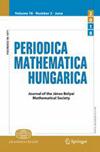关于有特殊类型素数 II 的三元二叉不等式
IF 0.5
3区 数学
Q3 MATHEMATICS
引用次数: 0
摘要
假设 N 是一个足够大的实数,E 是一个任意大的常数。本文证明,对于 \(1< c < \frac{7}{6}\), Diophantine 不等式 $$\begin{aligned}.|p_1^c+p_2^c+p_3^c-N|<(\log N)^{-E}\end{aligned}$$在素数变量 \(p_1,p_2,p_3\)中是可解的,因此每个数 \(p_i+2,\,i=1,2,3\),最多有\(\big [3.43655+{frac{12.12}{7-6c}}\big ]\)以倍数计算的素因子。本文章由计算机程序翻译,如有差异,请以英文原文为准。
On a ternary diophantine inequality with prime numbers of a special type II
Suppose that N is a sufficiently large real number and E is an arbitrarily large constant. In this paper, it is proved that, for \(1< c < \frac{7}{6}\), the Diophantine inequality
$$\begin{aligned} |p_1^c+p_2^c+p_3^c-N|<(\log N)^{-E} \end{aligned}$$is solvable in prime variables \(p_1,p_2,p_3\) so that each of the numbers \(p_i+2,\,i=1,2,3\), has at most \(\big [3.43655+{\frac{12.12}{7-6c}}\big ]\) prime factors counted with multiplicity.
求助全文
通过发布文献求助,成功后即可免费获取论文全文。
去求助
来源期刊
CiteScore
1.40
自引率
0.00%
发文量
67
审稿时长
>12 weeks
期刊介绍:
Periodica Mathematica Hungarica is devoted to publishing research articles in all areas of pure and applied mathematics as well as theoretical computer science. To be published in the Periodica, a paper must be correct, new, and significant. Very strong submissions (upon the consent of the author) will be redirected to Acta Mathematica Hungarica.
Periodica Mathematica Hungarica is the journal of the Hungarian Mathematical Society (János Bolyai Mathematical Society). The main profile of the journal is in pure mathematics, being open to applied mathematical papers with significant mathematical content.

 求助内容:
求助内容: 应助结果提醒方式:
应助结果提醒方式:


